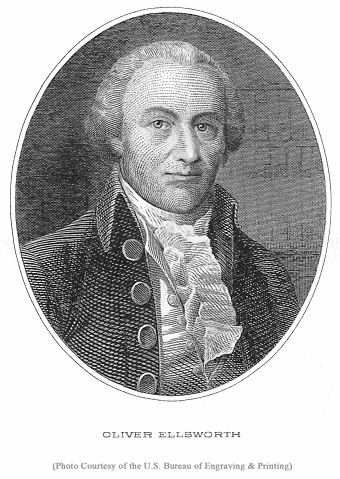Oliver Ellsworth was an American politician, attorney and revolutionary who helped draft the United States Constitution, and later went on to become the third Supreme Court Justice of the United States. He lived between 1745 and 1807, and made several contributions to the founding of the United States of America and the U.S. legal system.
Early history
Ellsworth was born on April 29, 1745, in Windsor, Connecticut. He attended Yale University in 1762 to study theology and transferred to the College of New Jersey (later to become Princeton) in 1764. Ellsworth soon focused his attention on law and was admitted to the bar in 1771. He began a reputable law practice soon after and become Connecticut’s state attorney for Hartford County and its representative at the Continental Congress in 1777.
Work on the Constitution
In 1787, Ellsworth attended the Constitutional Convention and created a resolution to an amendment that would change the word “national” to “United States,” and henceforth name the government the United States Government. In addition, he served on the Committee of Five that drafted the first copy of the Constitution. Ellsworth left the committee for business reasons, and therefore did not sign the final document. However, he wrote Letters of a Landholder to facilitate ratification of the Constitution and was a highly visible figure in Connecticut’s ratification convention.
Ellsworth served as a senator in Connecticut between 1789 to 1796, during which time he pushed the Judiciary Act that created a hierarchical structure of state and federal courts. He also bolstered a measure admitting North Carolina into the Union and served on budget committees that considered Alexander Hamilton’s economic program and the First Bank of the United States.
Supreme Court Justice
Ellsworth was nominated by George Washington to become Chief Justice of the Supreme Court in 1796, and was unanimously confirmed by the Senate the following day. During his tenure, he ruled in Hollingsworth v. Virginia that the President had no authority to amend the U.S. Constitution and his signature was unnecessary for ratifying amendments. New York v. Connecticut was also the first case in which the Supreme Court exercised its original jurisdiction in disputes between two states.
Later life
Ellsworth served as commissioner to France between 1799 and 1800 and left the Supreme Court while still overseas in 1800 due to illness. Upon his return in 1801, Ellsworth retired from public life. He served on the Connecticut Governor’s Council until his death is 1807.









